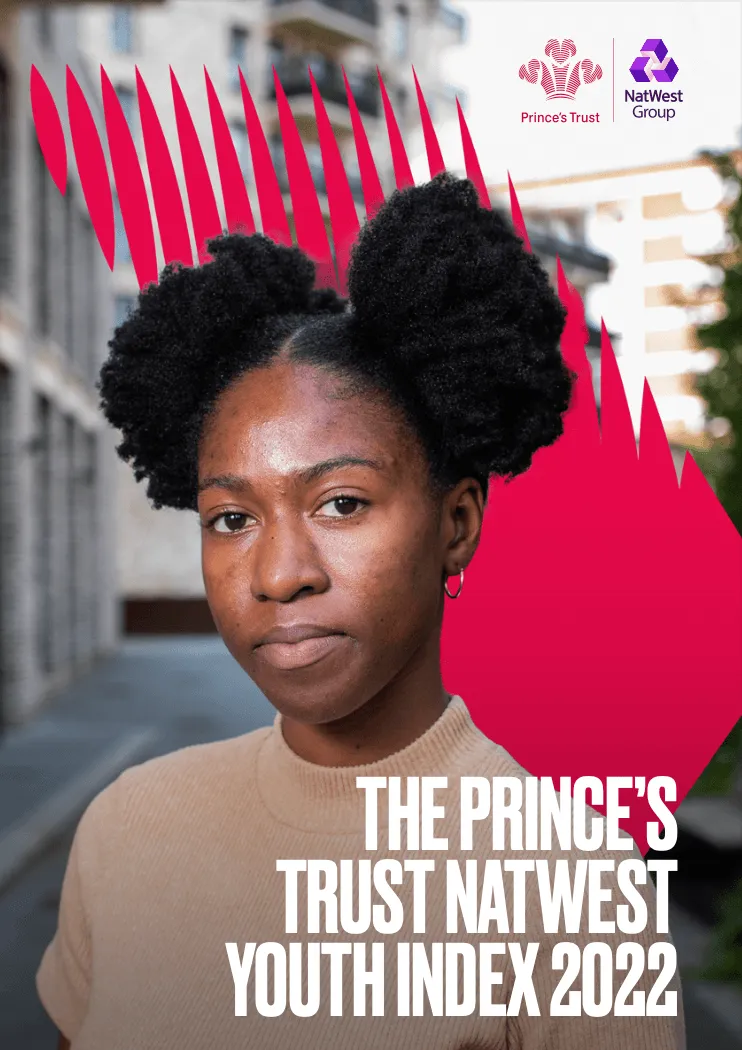
The Prince’s Trust NatWest Youth Index shows that young people’s overall happiness and confidence has fallen to an all-time low.
Index scores for almost all areas attributed to wellbeing are at their lowest to date. Young people are particularly worried about their qualifications and training, which is an area that saw some of the biggest drops in confidence and happiness. Other big concerns are work and employment, with confidence in this area having stagnated at its lowest level, and relationships with friends and family; for which the study measured a notable decrease in happiness.
Scarring effect of the pandemic
The report reveals the long-lasting impact the pandemic has had on young people’s wellbeing, with an alarming number of young people reporting a decline in their mental health. Many young people, particularly those who are unemployed and those who are from poorer backgrounds, feel as though they are set to fail in life.
• More than a fifth of young people (23 per cent) feel they will never recover from the emotional effects of the pandemic.
• Almost half of young people (48 per cent) report experiencing a mental health problem, with similar numbers stating their mental health had worsened during the pandemic (46 per cent).
• One in five young people surveyed (22 per cent) think they feel will fail in life, with this rising to a third among those who are NEET (34 per cent).
• Almost half of young people who are NEET (46 per cent) said being unemployed made them feel hopeless.
• Almost a quarter of young people from poorer backgrounds (21percent)and NEET young people (25 per cent) think their life will amount to nothing, no matter how hard they try.
• After emotional wellbeing, money is the area of young people’s lives where they feel the least happy and confident, with 33 per cent of young people saying they are unhappy with the amount of money they have.
Fears for future work
The way young people view their own employability as well as what they want from work has shifted in the wake of the pandemic, with many worried about how recent disruption to their education and employment will affect their long-term prospects.
• One in five young people (20 per cent) don’t think their employment prospects will ever recover from the pandemic. This figure rises to more than a quarter among those from poorer backgrounds (23 per cent) and who are NEET (27 per cent).
• Half of young people who have missed out on school or work due to the pandemic (50 per cent) believe they’ll be overlooked for jobs.
• Three quarters of young people who have missed out on school or work due to the pandemic (73 per cent) are frustrated at missing opportunities to help their future career.
• Almost half of young people (48 per cent) now consider the impact of a job on their mental health before accepting.
•Additionally, over a quarter (28percent) state they want their job to be pandemic proof , with one in five (19 per cent) stating that the pandemic has motivated them to start a new career.
Relationships at risk
The pandemic has had a damaging impact on young people’s social lives and relationships. The happiness young people feel in their relationships with both friends and family have dropped to the lowest levels on record, with many young people reporting feeling lonely as well as nervous about socialising.
• Four in ten young people (40 per cent) say they feel anxious about socialising with people because of the pandemic.
• More than four in ten young people (45 per cent) say that their social life has got worse since the start of the pandemic.
• More than a third of young people (36 per cent) say the pandemic has made it harder to make new friends.
• More than one in five young people (22 per cent) say the pandemic has made it more difficult to keep existing friendships.
Pressures on young women
Young women’s current happiness as well as their confidence in the future has dropped, with worries about their mental health and their outlook on employment contributing to this fall. Many young women feel that building confidence is key to helping them unlock their potential.
• A quarter of young women (26 per cent) don’t think they will ever recover from the emotional impact of the pandemic, compared to 19 per cent of young men.
• Young women’s overall wellbeing has dropped from 68 to 67 points, in a return to the lowest score ever recorded by this study.
• Half of young women (50 per cent) agree the pandemic has made their mental health worse, compared to 41 per cent of young men.
• A quarter of young women (25 per cent) feel like they are going to fail in life, compared to 19 per cent of young men.